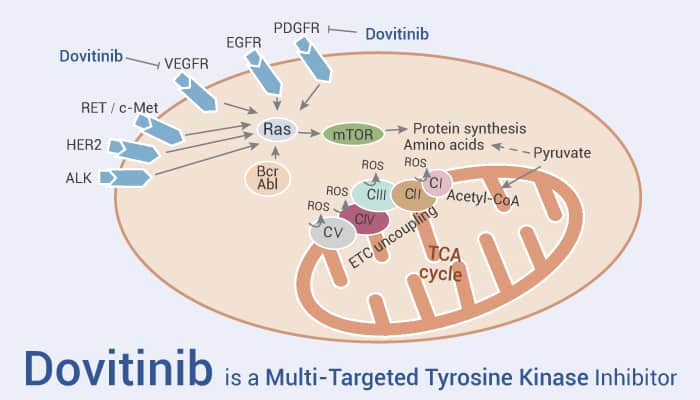Tyrosine kinase is an enzyme that can transfer phosphate groups from ATP to tyrosine residues of specific proteins in cells. Specifically, this covalent post-translational modification is a key component of normal cell communication and homeostasis maintenance. Tyrosine kinase is an important mediator of signal cascade reaction. Besides, it plays a key role in many biological processes such as growth, differentiation, metabolism, and apoptosis in response to external and internal stimuli. Moreover, the tyrosine kinase signaling pathway can usually prevent uncontrolled proliferation or contribute to the sensitivity to apoptosis stimulation.
Furthermore, tyrosine kinase is an intracellular enzyme that mediates tyrosine phosphorylation of downstream molecules. These signaling pathways usually undergo genetic or epigenetic changes in cancer cells to give cancer cells a selective advantage. Meanwhile, receptor tyrosine kinase (RTK) and protein phosphatase control reversible protein phosphorylation. Nonetheless, tyrosine kinase is an excellent therapeutic target for targeted therapy of various diseases. Here, we will introduce a multi-targeted tyrosine kinase inhibitor, Dovitinib.
Dovitinib is a Multi-Targeted Tyrosine Kinase Inhibitor.

Above all, Dovitinib has IC50s of 1, 2, 8/9, 10/13/8, 27/210 nM for FLT3, c-Kit, FGFR1/FGFR3, VEGFR1/VEGFR2/VEGFR3, and PDGFRα/PDGFRβ, respectively. Importantly, Dovitinib effectively inhibited the growth of FGF stimulated WT and B9 cells expressing F384L-FGFR3.
Secondly, Dovitinib inhibits cell proliferation of KMS11, OPM2, and KMS18 cells with IC50 of values of 90 -550 nM. Particularly, Dovitinib significantly reduces the basal phosphorylation levels of FGFR-1, FGFR substrate 2α (FRS2-α), and ERK1/2. Dovitinib does not affect Akt in both SK-HEP1 and 21-0208 cells. Obviously, Dovitinib enhances the BMP-2-induced alkaline phosphatase (ALP) induction. Dovitinib stimulates the translocation of phosphorylated Smad1/5/8 into the nucleus. Interestingly, it stimulates phosphorylation of mitogen-activated protein kinases, including ERK1/2 and p38. Dovitinib induces caspase-dependent apoptosis in IM-9 cells.
Once again, Dovitinib with 10-60 mg/kg by p.o. shows a significant antitumor effect in the KMS11-bearing mice model. Additionally, Dovitinib with 50 and 75 mg/kg results in 97% and 98% tumor growth inhibition, respectively.
All in all, Dovitinib is a multi-targeted tyrosine kinase inhibitor.
References:
Trudel S, et al. Blood. 2005, 105(7), 2941-2948.